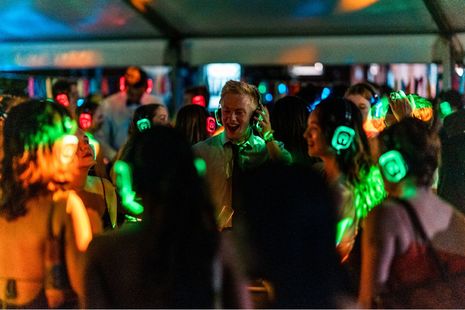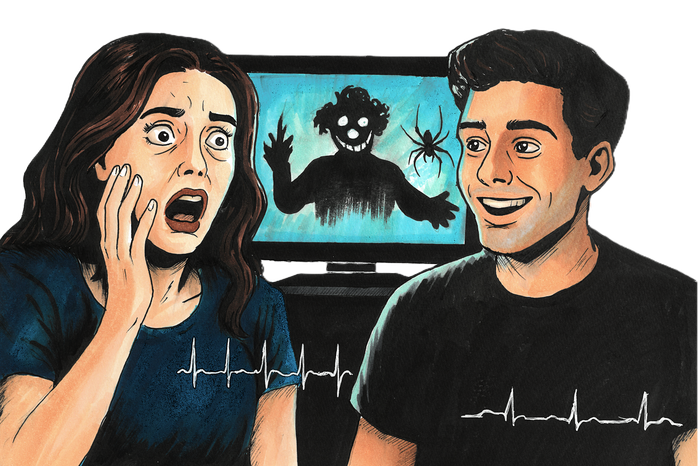A biological defence of clubbing
Kalina Poydovska explores the neural and evolutionary roots of our urge to club

It’s 2 a.m. The floor is sticky, someone is belting Love Story into your ear, and your puffer went missing long ago. Yet… you’re having a great time.
Objectively, it seems like clubbing should not be enjoyable. The music is deafening, the crowds are sweaty, and the options in Cambridge are limited. Yet students invariably clock in for their weekly shift at Revs. So why do we seek out clubbing, and is there a possibility that it could even be good for us?
It has been suggested that dancing in a group benefits the brain’s social function. Dance might literally help you to get on the same wavelength as your friends. This seems a genuine neuroscientific phenomenon – brain wave oscillations can sync up between people, allegedly aiding communication. The phenomenon where rhythmic stimuli (like sounds) can align people’s physiological processes is called ‘entrainment’. Bass may play a particularly important role in tuning your brain’s representation of the beat. Therefore, the music associated with clubbing may help you to develop valuable social connections.
"Think of clubs as the modern-day campfire"
Engaging in this communal rhythmic behaviour may take us back to our hunter-gatherer roots – think of clubs as the modern-day campfire. The ‘hive hypothesis’ claims that engaging in synchronised group movements and losing your sense of self is important for psychological flourishing.
This raises the question: why do we not just dance like this outside of clubs? Maybe because it isnot socially acceptable to bop around awkwardly in a circle, unless it’s dark, crowded, and everyone around you is doing it too. Booming music builds a sense of excitement, perhaps because loud sounds activate parts of the brainstem (called the reticular formation) that keep us awake and alert. It has also been suggested that as we accumulate more positive experiences to do with clubbing, we associate these enjoyable feelings with the club environment, meaning we are further conditioned to enjoy and seek out loud music.
The excitement might begin hours before you even reach the dance floor. Dopamine is often described as the brain’s ‘reward’ chemical, but counterintuitively, dopamine levels peak in anticipation of a reward rather than when something pleasurable actually happens. The high starts during the getting ready ritual: outfits, makeup, and Spotify playlists are all cues that remind your brain of the coming experience. This predictive dopamine surge explains why the pres can feel better than the club itself – though paradoxically, they might not feel quite so good without the promise of what comes after.
"This predictive dopamine surge explains why the pres can feel better than the club itself"
Although not integral to the clubbing experience, it is interesting to ask: why do we drink? Intoxication increases activity in ‘reward circuits’ (including the ventral striatum, where dopamine is released), which promotes pleasurable feelings. Alcohol further appears to decrease activity in brain regions associated with fear responses. The brain starts using more inhibitory (rather than excitatory) neurotransmitters, reducing anxiety – explaining why a night at Revs might feel like the perfect antidote to an essay crisis.
Of course, limiting your threat-detection abilities can be dangerous as well as liberating. The more confident you feel, the more dangerous drunk VOI-ing becomes. And as anyone who has spent time in the Mash bathrooms can probably attest, reduced inhibition also results in a tendency to overshare.
When you finally make it back to your accommodation, the alcohol (and likely tiredness from the late night) may help you swiftly sink into slumber. One study found that alcohol increases slow-wave sleep, which is the deepest stage of non-REM sleep, thought to be important for functions like memory consideration and clearing waste from the brain. Higher doses of alcohol may interfere with REM sleep, however, robbing you of your dreams and a clear head the next day.
Alcohol may contribute to bonding on a societal level. Recent research reported that alcohol consumption is associated with more complex social hierarchies in non-industrial societies. The authors suggest that it reinforces political power, provides a labour incentive, and strengthens group identity. It has even been suggested that the desire to make alcohol drove the shift from hunting and gathering to agriculture. It is debatable whether this transition was for better or worse, but alcohol seems a potent motivator for group activity.
Not all aspects of clubbing may be good for you — but at least your enjoyment of it is biologically defensible. You could even see it as a way to connect with your ancestral instincts – perhaps a more creative way to justify that night out to your supervisor.
 News / Colleges charge different rents for the same Castle Street accommodation2 March 2026
News / Colleges charge different rents for the same Castle Street accommodation2 March 2026 News / News in Brief: waterworks, wine woes, and workplace wins 1 March 2026
News / News in Brief: waterworks, wine woes, and workplace wins 1 March 2026 News / Climate activists protest for ‘ethical careers policy’1 March 2026
News / Climate activists protest for ‘ethical careers policy’1 March 2026 News / Private school teacher who lied about Cambridge degree barred from teaching27 February 2026
News / Private school teacher who lied about Cambridge degree barred from teaching27 February 2026 News / Angela Merkel among Cambridge honorary degree nominees27 February 2026
News / Angela Merkel among Cambridge honorary degree nominees27 February 2026









